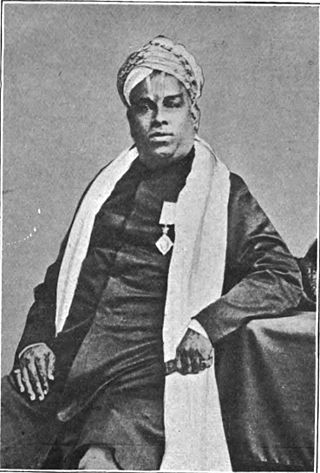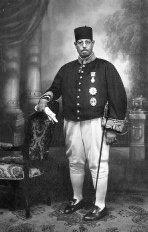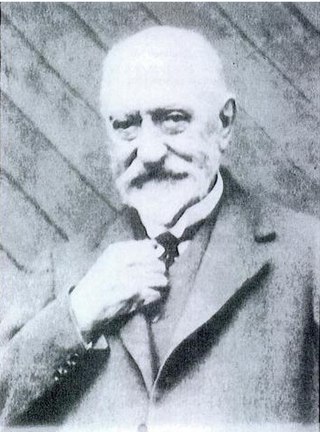Related Research Articles

The Governor-General of India was the representative of the monarch of the United Kingdom in their capacity as the Emperor/Empress of India and after Indian independence in 1947, the representative of the Monarch of India. The office was created in 1773, with the title of Governor-General of the Presidency of Fort William. The officer had direct control only over his presidency but supervised other East India Company officials in India. Complete authority over all of British territory in the Indian subcontinent was granted in 1833, and the official came to be known as the "Governor-General of India".

The Most Eminent Order of the Indian Empire is an order of chivalry founded by Queen Victoria on 1 January 1878. The Order includes members of three classes:
- Knight Grand Commander (GCIE)
- Knight Commander (KCIE)
- Companion (CIE)

Arthur Oliver Villiers Russell, 2nd Baron Ampthill, was a British peer and civil servant. He served as Governor of Madras from October 1900 to February 1906, and as acting Viceroy of India from April to December 1904.

Sir Mountstuart Elphinstone Grant Duff, known as M. E. Grant Duff before 1887 and as Sir Mountstuart Grant Duff thereafter, was a Scottish politician, administrator and author. He served as the Under-Secretary of State for India from 1868 to 1874, Under-Secretary of State for the Colonies from 1880 to 1881 and the Governor of Madras from 1881 to 1886.

The Imperial Legislative Council (ILC) was the legislature of British India from 1861 to 1947. It was established under the Charter Act of 1853 by providing for the addition of 6 additional members to the Governor General Council for legislative purposes. Thus, the act separated the legislative and executive functions of the council and it was this body within the Governor General's Council which came to known as the Indian/Central Legislative Council. In 1861 it was renamed as Imperial Legislative Council and the strength was increased.

Vembaukum RamiengarCSI was an Indian civil servant and administrator who served as the Diwan of Travancore from 1880 to 1887.
Diwan Bahadur Rishiyur Venkata Srinivasa Aiyar was an Indian civil servant, legislator and politician from the Madras Presidency.

Khan Bahadur Sir Mohammad Usman was an Indian politician, hakim and socialite who served as the Minister of Home for the Madras Presidency in the Justice Party government of the Raja of Bobbili and as the first Indian acting Governor of Madras from 16 May 1934 to 16 August 1934. His name is often written Muhammad Usman.
Sir Norman Edward Marjoribanks was a British magistrate and civil servant of British origin who served as the acting Governor of Madras from 29 June 1929 to 11 November 1929.

Eardley John Norton was a Madras barrister, coroner and politician of British origin. He was also one of the earliest members of the Indian National Congress and a champion of civil liberties and rights of the Indian people.

Rao Bahadur S. A. Saminatha Iyer, also known as Thanjavur Saminatha Iyer, was an Indian lawyer, landlord, politician and theosophist who served as Chairman of the Tanjore municipality and a delegate to the 1885, 1886, 1887, 1889 and 1894 sessions of the Indian National Congress. He spoke against salt tax in the first session conducted in 1885 and in 1887, was a part of a 32-member team that wrote the constitution of the Congress. Christopher Baker and D. A. Washbrook describe him as the "most celebrated spokesman of the Tanjore gentry".
Sir George Townsend BoagKCIECSI (1884–1969) was a British Indian civil servant, statistician and administrator who served as the Acting Governor of Odisha from 11 August 1938 to 8 December 1938.
Sir William Mackworth Young was a member of the Indian Civil Service, who became Lieutenant-Governor of the Punjab 1897–1902.
Sir James Thompson was a British civil servant and administrator who acted as the governor of Madras from 30 April 1904 to 13 December 1904.
James Duncan SimCSI was a British civil servant of the Indian civil service who served as a member of the Madras Legislative Council from March 1870 to March 1875.
Sir Henry Edward Stokes was an Irish civil servant of the Indian Civil Service who served as a member of the Madras Legislative Council from 1888 to 1893.
Sir Henry William BlissKCIE was a British civil servant of the Indian civil service who served as a member of the Imperial Legislative Council of India from 1890 to 1892 and Madras Legislative Council from 1893 to 1898.
Sir Thomas Eyebron MoirKCIE CSI (1874-1932) was an Indian civil servant of British origin. He served as the Revenue member of the executive council of the Governor of Madras from 1925 to 1930.
Sir Lionel Davidson, was an Indian civil servant who served as a member of the Executive Council of the Governor of Madras.

Sir Francis Joseph Edward Spring was an Anglo-Irish civil engineer and member of the Imperial Legislative Council who played a pioneering role in development of the Indian Railways. Spring is largely remembered today for championing the cause of the Indian mathematician Srinivasa Ramanujan.
References
- Buckland, C. E. (1906). Dictionary of Indian Biography. London: Swan Sonnenschein & Co. p. 279.